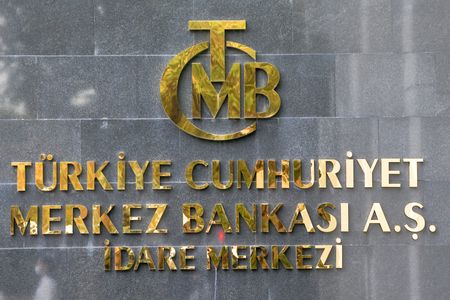
ISTANBUL (Reuters) – Turkey’s central bank is expected to keep its policy rate unchanged next week, a Reuters poll showed on Thursday, having decided to end the cycle after cutting it to 9% in line with President Tayyip Erdogan’s call for single-digit rates.
The central bank has lowered its one-week repo rate by 500 basis points in four months in an easing cycle that it said was necessary given signs of an economic slowdown, despite inflation which stood at more than 84% in November.
The central bank will announce its rate decision at 1100 GMT on Dec. 22.
All 13 economists that participated in the Reuters poll expected the repo rate to remain unchanged at 9%, after the bank said last month that it decided to end the easing cycle.
Economists say the path of monetary policy for next year will depend on the outcome of presidential and parliamentary elections scheduled for June 2023 at the latest.
Another victory by Erdogan is likely to see the continuation of unorthodox policies that prioritise growth and exports, while the main opposition bloc would ensure the central bank’s independence, allowing it to raise rates.
Some economists in the Reuters poll saw the policy rate being raised as high as 30% by the end of 2023.
Annual inflation in Turkey eased for the first in 17 months in November, after touching a peak of 85.5% a month earlier. It was mainly stoked by a currency crisis resulting from an easing cycle in late 2021 lowering the repo rate by 500 basis points.
Erdogan, a self-described “enemy” of interest rates, aims to boost investments, production, exports and employment while lowering rates under his economic programme.
The central bank expects inflation to drop to 65.2% by end-2022, thanks largely to a so-called base effect, compared to a median estimate of 69% in the latest Reuters poll.
The bank says it will achieve a permanent fall in inflation once Turkey’s chronic current account deficits turn to a surplus under the new economic plan. Ankara does not see a surplus in its economic projections that cover the period to 2025.
(Reporting by Ali Kucukgocmen, Ezgi Erkoyun and Milounee Purohit; Editing by Daren Butler)

